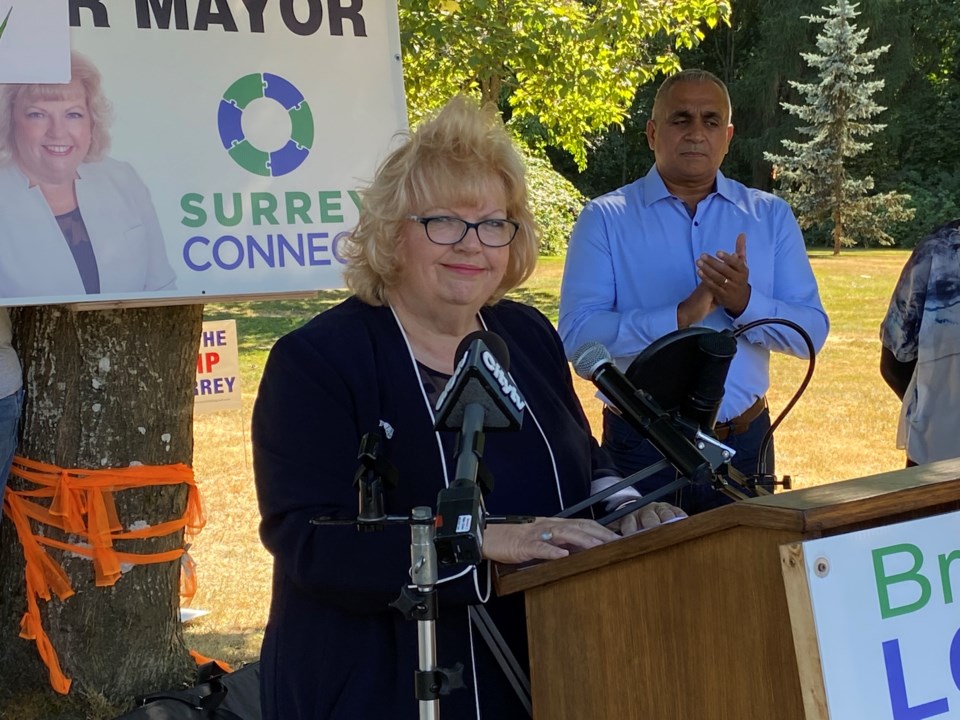Surrey residents have long enjoyed some of the lowest property taxes in the Lower Mainland for decades, but that badge of honour is likely coming to an end thanks to a municipal police transition project that’s far exceeded spending expectations as well as much-needed infrastructure projects the city has not saved enough for.
In 2009, the Fraser Institute noted Surrey had the lowest property taxes among Metro Vancouver municipalities. In 2012, it rose to third-last and by 2018 it had reached the 13th spot out of 19 city halls, according to B.C government data. To this day it still has the lowest “general municipal” portion of taxes in the region, excluding a parcel tax, which rose $200, to $300, in 2019. Now, the city seems poised to climb up the middle of the pack.
When Surrey Mayor Brenda Locke issued a public statement on Jan. 6 indicating a one-time 55 per cent tax hike to residential and commercial properties was needed to pay for the completion of the Surrey Police Service (SPS), she was rebuked by her critics, including the service itself. Political rivals at Safe Surrey Coalition called it “outrageous” and Coun. Linda Annis said it was a “scare tactic.”
Locke started her first term on Surrey city council in 2018 with Safe Surrey Coalition but left within a year citing transparency and budget concerns of the transition project. She called on former mayor Doug McCallum to cancel the project until finally unseating him in last October’s election.
In an interview with Glacier Media, Locke confirmed the average valued residential home will see a $1,200 one-time bill while the average commercial property will see a $7,700 one-time bill. Locke clarified the bill could be spread out over multiple years.
The bill is to address the transition project (decommissioning Surrey RCMP for the municipal SPS), which is estimated to over five years. The city is actually projecting a $268-million funding shortfall to 2026, should the SPS project be maintained.
Conversely, , endorsed by Locke’s Surrey Connect slate, the city is still looking at a $72-million shortfall, to 2026, which could mean a one-time bill about a third of what Locke suggests is needed for SPS.
“Absolutely, that is going to have to be paid for… And that will be in the budget, starting in whatever year. We start that in what I assume will be this year,” if the RCMP is maintained, said Locke, of such a scenario.
Locke conceded she doesn’t know exactly what Surrey taxpayers will be facing next year or in the near term.
“It's difficult to try and put it into such as a succinct story for the public, right? At the end of the day, this is the stuff that should have been done on day one; a feasibility study, and all these pieces, should have been done,” said Locke.
The root of the problem now is that the transition requires hundreds of more officers to be on salary but not necessarily on duty — a double staffing cost never envisioned in an initial report on the transition.
In essence, a new SPS officer hired on does not necessarily mean a Mountie is removed from the force. There are over 100 SPS officers not on duty but being paid nevertheless.
“The rate of hiring and deployment of SPS members and demobilization of the RCMP is a crucial financial driver in relation to the overall policing budget,” noted a third quarter financial report from the city in November 2022.
Coun. Doug Elford of Safe Surrey Coalition, a continued SPS proponent, told Glacier Media the double staffing costs is something that came into play only after the transition was approved.
“This is what the premise was; one up, one down. And when we discussed this in the past, this is what we were basing our information on. Obviously, the (provincial trilateral committee of the city, RCMP and SPS) hasn’t followed that path let’s just say,” said Elford.
This year, policing is estimated to cost Surrey $301 million if the transition continues. If the province decides the city can keep the RCMP, policing will cost $298 million in 2023, because total SPS operations will cost $111 million, including an estimate $80 million severance cost (as much as 18 months for three months of service), which Locke calls a “poison pill” in the contract.
Adding to problems has been ongoing increases to one-time police transition costs that were envisioned in the original report, such as equipment, vehicles and, most notably information technology. ; then $21 million in 2021 and now $32 million. Only $18 million has been spent to date, according to SPS.
Although the double staffing issue is the main driver of the $235 million, the SPS would also mean larger annual operating costs ($211 million for SPS to $174 million for RCMP in 2027), adding to the annual tax bill.
Although higher costs were expected by all parties in 2019, SPS claims the current estimated gap in operating costs could be roughly half of what the city claims; SPS likens its estimate to the initial transition report.
Annis says there are too many players dealing with the matter and wants to see an independent review of the books.
“I do think it’s going to be significant either way,” said Annis.
“The original plan in simple terms, for me, was you hire one, you lose one on the other side,” she said.
Now, said Annis, “our finances are in a mess.”
Locke has long charged that the former administration led by McCallum has moved money from infrastructure projects to pay for transition costs.
The city increased its parcel tax by $200 per residential lot in 2022 to fund infrastructure projects, despite delaying projects previously budgeted for, Locke noted. Furthermore, the city has increased its debt over 50 per cent since 2018, from $229 million to $356 million, in 2022. The debt is to pay for a new park and community centre in Newton, a recreational facility and the long-delayed Cloverdale arena.
The city notes in its financial reports it has a $1.7-billion investment portfolio, although these funds are already allocated to specific capital projects or are funds that have been invested until they are needed (such as development cost charges for future parks, community centres, roads and utilities).
Elford disagrees with Annis’ assertion the city is under financial stress.
“If you look at our books, we’re in pretty good shape,” he said.
“Overall, the City’s financial performance in relation to the adopted budget has been stronger than anticipated for the first nine months of fiscal 2022,” stated Surrey’s chief financial officer Kam Grewal in his quarterly report.




